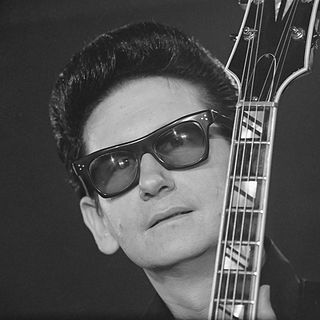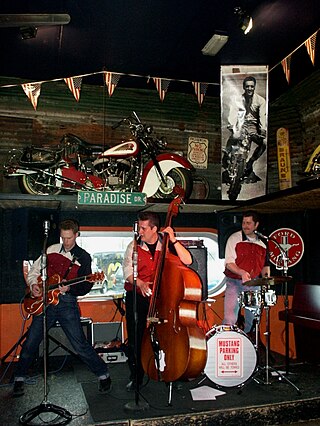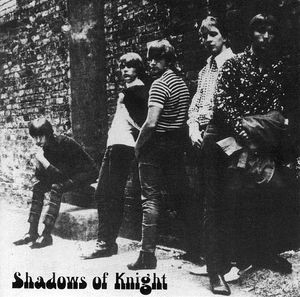
Roy Kelton Orbison was an American singer, songwriter, and guitarist known for his distinctive and powerful voice, complex song structures, and dark, emotional ballads. Orbison's music is mostly in the rock genre and his most successful periods were in the early 1960s and the late 1980s. He was nicknamed "The Caruso of Rock" and "The Big O". Many of Orbison's songs conveyed vulnerability at a time when most male rock-and-roll performers projected machismo. He performed with minimal motion and in black clothes, matching his dyed black hair and dark sunglasses.
Garage rock is a raw and energetic style of rock and roll that flourished in the mid-1960s, most notably in the United States and Canada, and has experienced a series of subsequent revivals. The style is characterized by basic chord structures played on electric guitars and other instruments, sometimes distorted through a fuzzbox, as well as often unsophisticated and occasionally aggressive lyrics and delivery. Its name derives from the perception that groups were often made up of young amateurs who rehearsed in the family garage, although many were professional.

Rockabilly is one of the earliest styles of rock and roll music. It dates back to the early 1950s in the United States, especially the South. As a genre it blends the sound of Western musical styles such as country with that of rhythm and blues, leading to what is considered "classic" rock and roll. Some have also described it as a blend of bluegrass with rock and roll. The term "rockabilly" itself is a portmanteau of "rock" and "hillbilly", the latter a reference to the country music that contributed strongly to the style. Other important influences on rockabilly include western swing, boogie-woogie, jump blues, and electric blues.

The Shadows of Knight were an American rock band from Chicago, Illinois, that played a version of British blues influenced by their native city. When they began recording in 1965, the band's self-description was "the Stones, Animals and the Yardbirds took the Chicago blues and gave it an English interpretation. We've taken the English version of the Blues and re-added a Chicago touch," to which rock critic Richie Unterberger commented: "The Shadows of Knight's self-description was fairly accurate."

77 Sunset Strip is an American television private detective drama series created by Roy Huggins and starring Efrem Zimbalist Jr., Roger Smith, Richard Long and Edd Byrnes. Each episode was one hour long when aired with commercials. The show ran from 1958 to 1964. The character of detective Stuart Bailey was first used by writer Huggins in his 1946 novel The Double Take, later adapted into the 1948 film I Love Trouble.

Cosmo's Factory is the fifth studio album by American rock band Creedence Clearwater Revival, released by Fantasy Records on July 8, 1970. Six of the album's eleven tracks were released as singles in 1970, and all of them charted in the top 5 of the Billboard Hot 100. The album spent nine consecutive weeks in the number one position on the Billboard 200 chart and was certified 4x platinum by the Recording Industry Association of America (RIAA) in 1990. Rolling Stone ranked it number 413 on its 2020 list of the "500 Greatest Albums of All Time".

The Chocolate Watchband is an American garage rock band that formed in 1965 in Los Altos, California. The band went through several lineup changes during its existence. Combining psychedelic and garage rock components, their sound was marked by David Aguilar's lead vocals, songwriting, as well as proto-punk musical arrangements. The band's rebellious musical posture made them one of the harder-edged groups of the period with many critics labeling them as America's answer to the Rolling Stones.

Stampede is the fifth studio album by American rock band the Doobie Brothers. The album was released on April 25, 1975, by Warner Bros. Records. It was the final album by the band before Michael McDonald replaced Tom Johnston as lead vocalist and primary songwriter. The album has been certified gold by the RIAA.

The Music Machine was an American rock band formed in Los Angeles, California in 1966. Fronted by chief songwriter and lead vocalist Sean Bonniwell, the band cultivated a characteristically dark and rebellious image reflected in an untamed musical approach. Sometimes it made use of distorted guitar lines and hallucinogenic organ parts, punctuated by Bonniwell's distinctively throaty vocals. Although they managed to attain national chart success only briefly with two singles, the Music Machine is today considered by many critics to be one of the groundbreaking acts of the 1960s. Their style is now recognized as a pioneering force in proto-punk; yet within a relatively short period of time, they began to employ more complex lyrical and instrumental arrangements that went beyond the typical garage band format.

The Last Drive is a Greek punk garage rock group. They formed in 1983, broke up in 1995, and reunited in January 2007.

Creedence Country is a compilation album by American rock band Creedence Clearwater Revival (CCR). It was released by Fantasy Records in October 1981 with the purpose of infiltrating the country market.

"Painter Man" is a song written by British singer Kenny Pickett and guitarist Eddie Phillips, and first recorded by their group the Creation. It was released as a single in October 1966. Written as a response to their avant-garde stage show, the single was their only top-forty hit on the UK Singles Chart, reaching number 36. It fared better in West Germany, where it reached number eight. It was later issued on their album We Are Paintermen.
Robert "Bobby" Winkelman is an American singer, song writer, rhythm guitarist, and bass guitarist. He was a founding member of the East Bay band, "The Epics".
"Tryin' to Get to You" is a song written by R&B singer songwriters Rose Marie McCoy and Charles Singleton. It was originally recorded by the Washington DC vocal group The Eagles in 1954 and released in mid-1954 on Mercury Records 70391. The format of the title on The Eagles’ record was “Tryin’ to Get to You”, with an apostrophe.

Ace of Cups is an American rock band formed in San Francisco in 1967 during the Summer of Love era. It has been described as one of the first all-female rock bands.
Jerald Edward Kolbrak, known professionally as Jerry Cole, was an American guitarist who recorded under his own name, under various budget album pseudonyms and as an uncredited session musician.
The Sting-rays were a British rock band from Greater London which recorded on Ace Records' garage and psychedelic subsidiary Big Beat and Joe Foster's Kaleidoscope Sound in the 1980s.

Raw 'n' Alive at the Cellar, Chicago 1966! is a live album by the American garage rock band the Shadows of Knight, and was released on Sundazed Records in 1992. The album consists of recordings from the band's appearance at the Cellar in Arlington Heights, Illinois in December 1966. Although the tapes were never anticipated to be released publicly, Raw 'n' Alive at the Cellar is commended for its good sound quality, and represents one of the better live concert recordings to emerge from the garage rock era.
Arlie Dean Neaville, also known as Dean Carter, was an American gospel singer and songwriter who was active in music from the early 1960s. For several years during the 1960s he recorded and performed as Dean Carter, specializing in rockabilly and soul influenced garage rock displayed in songs such as "Rebel Woman" and a version of "Jailhouse Rock", but in the early 1970s he switched to gospel.













